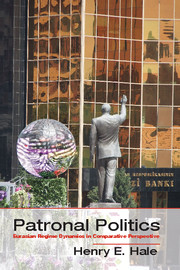Book contents
- Frontmatter
- Contents
- List of Figures
- List of Tables
- Acknowledgments
- Note on Transliteration
- 1 Introduction
- 2 Patronal Politics and the Great Power of Expectations
- 3 Eurasian History as Patronal Politics
- 4 Constitutions, Elections, and Regime Dynamics
- 5 The Emergence of Networks and Constitutions
- 6 The Building of Eurasia’s Great Power Pyramids
- 7 Revolutions and Other Presidential Ousters
- 8 Nonrevolution in Post-Soviet Presidential Systems
- 9 After Revolution
- 10 Patronal Parliamentarism
- 11 Explaining Post-Soviet Regime Dynamics
- 12 Patronal Politics in Global Comparative Perspective
- References
- Index
- References
2 - Patronal Politics and the Great Power of Expectations
Published online by Cambridge University Press: 05 November 2014
- Frontmatter
- Contents
- List of Figures
- List of Tables
- Acknowledgments
- Note on Transliteration
- 1 Introduction
- 2 Patronal Politics and the Great Power of Expectations
- 3 Eurasian History as Patronal Politics
- 4 Constitutions, Elections, and Regime Dynamics
- 5 The Emergence of Networks and Constitutions
- 6 The Building of Eurasia’s Great Power Pyramids
- 7 Revolutions and Other Presidential Ousters
- 8 Nonrevolution in Post-Soviet Presidential Systems
- 9 After Revolution
- 10 Patronal Parliamentarism
- 11 Explaining Post-Soviet Regime Dynamics
- 12 Patronal Politics in Global Comparative Perspective
- References
- Index
- References
Summary
For many countries, pervasive “corruption” and low regard for the law are not simply a tumor on the body politic, something that can be isolated and excised. Instead, they are more like the body’s lifeblood. Not only do they course throughout the whole of society – connecting state, individual, and economy – but they deliver vital nourishment that keeps society functioning and growing. Paying a bribe, using one’s position to help relatives, or circumventing legal “red tape” can be an indispensible means of getting almost anything done. What is even more often missed by outsiders, however, is that these practices can also be a form of mass empowerment and even reflect a certain morality given the real choices they face. When officials are lazy or callous, offering a “gift” (bribe) can be one way citizens can get them to respond to their needs or simply do their job well. Badly underpaid officials can understand taking such gifts as a lesser of evils, necessary under the circumstances if they are to practice their professions while also feeding their families. The bureaucrat who fails to use his position to “look out for his own” can become not only ineffectual – lacking “favor bank” assets that can help him be a competent public servant – but seen as callous and even selfish, neglectful of his duties to family, friends, or community. The developer who fails to pay off the right people might find her plans to provide the community with sorely needed housing stymied.
People in such societies are caught in a vicious cycle. Not expecting others to behave according to formal rules, few risk working together when cheating is possible and the stakes are high without a side payment, a tight personal bond, or some kind of guarantee backed by force, the kind of force that can be supplied by a patron in high office or a criminal organization (if the two are distinct). Not expecting the government to implement policy impartially, citizens pressure their own patrons to milk that government for all they can while in office lest others suck the resources dry first. Social science might call this a social equilibrium: Given that everyone expects everyone else to behave this way, it makes no sense for an individual to behave differently since she would only wind up hurting herself and possibly those who depend on her, possibly severely.
- Type
- Chapter
- Information
- Patronal PoliticsEurasian Regime Dynamics in Comparative Perspective, pp. 19 - 38Publisher: Cambridge University PressPrint publication year: 2014

